Dan Ding
SlowFocus: Enhancing Fine-grained Temporal Understanding in Video LLM
Feb 03, 2026Abstract:Large language models (LLMs) have demonstrated exceptional capabilities in text understanding, which has paved the way for their expansion into video LLMs (Vid-LLMs) to analyze video data. However, current Vid-LLMs struggle to simultaneously retain high-quality frame-level semantic information (i.e., a sufficient number of tokens per frame) and comprehensive video-level temporal information (i.e., an adequate number of sampled frames per video). This limitation hinders the advancement of Vid-LLMs towards fine-grained video understanding. To address this issue, we introduce the SlowFocus mechanism, which significantly enhances the equivalent sampling frequency without compromising the quality of frame-level visual tokens. SlowFocus begins by identifying the query-related temporal segment based on the posed question, then performs dense sampling on this segment to extract local high-frequency features. A multi-frequency mixing attention module is further leveraged to aggregate these local high-frequency details with global low-frequency contexts for enhanced temporal comprehension. Additionally, to tailor Vid-LLMs to this innovative mechanism, we introduce a set of training strategies aimed at bolstering both temporal grounding and detailed temporal reasoning capabilities. Furthermore, we establish FineAction-CGR, a benchmark specifically devised to assess the ability of Vid-LLMs to process fine-grained temporal understanding tasks. Comprehensive experiments demonstrate the superiority of our mechanism across both existing public video understanding benchmarks and our proposed FineAction-CGR.
SafeWork-R1: Coevolving Safety and Intelligence under the AI-45$^{\circ}$ Law
Jul 24, 2025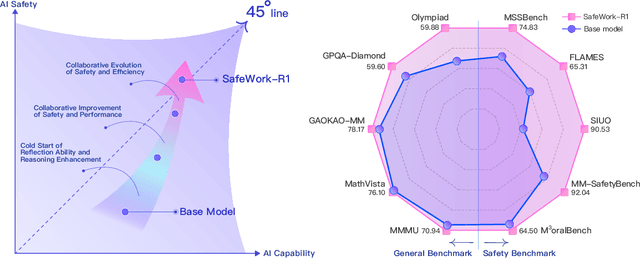
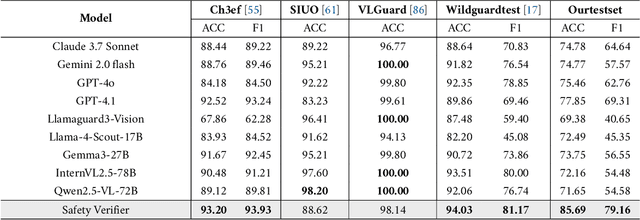
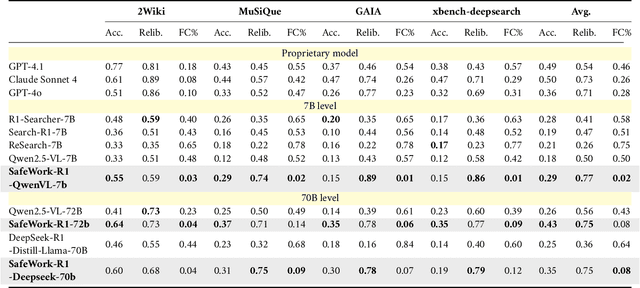

Abstract:We introduce SafeWork-R1, a cutting-edge multimodal reasoning model that demonstrates the coevolution of capabilities and safety. It is developed by our proposed SafeLadder framework, which incorporates large-scale, progressive, safety-oriented reinforcement learning post-training, supported by a suite of multi-principled verifiers. Unlike previous alignment methods such as RLHF that simply learn human preferences, SafeLadder enables SafeWork-R1 to develop intrinsic safety reasoning and self-reflection abilities, giving rise to safety `aha' moments. Notably, SafeWork-R1 achieves an average improvement of $46.54\%$ over its base model Qwen2.5-VL-72B on safety-related benchmarks without compromising general capabilities, and delivers state-of-the-art safety performance compared to leading proprietary models such as GPT-4.1 and Claude Opus 4. To further bolster its reliability, we implement two distinct inference-time intervention methods and a deliberative search mechanism, enforcing step-level verification. Finally, we further develop SafeWork-R1-InternVL3-78B, SafeWork-R1-DeepSeek-70B, and SafeWork-R1-Qwen2.5VL-7B. All resulting models demonstrate that safety and capability can co-evolve synergistically, highlighting the generalizability of our framework in building robust, reliable, and trustworthy general-purpose AI.
LAMS: LLM-Driven Automatic Mode Switching for Assistive Teleoperation
Jan 15, 2025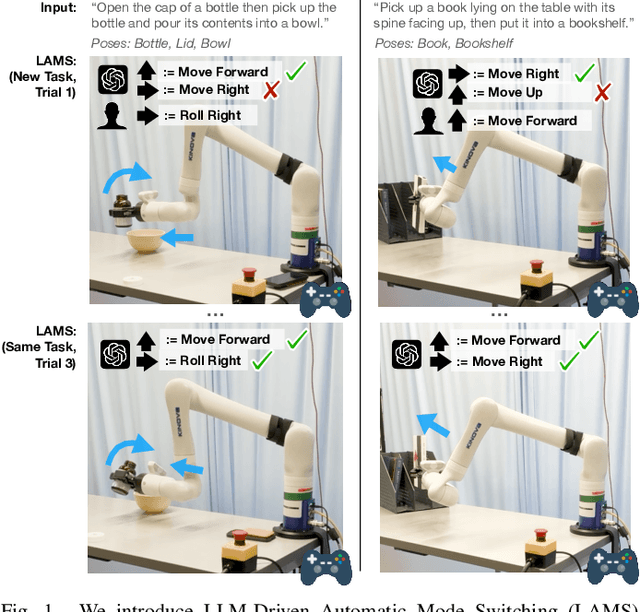
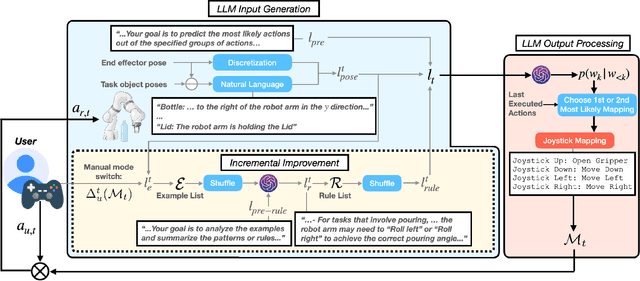
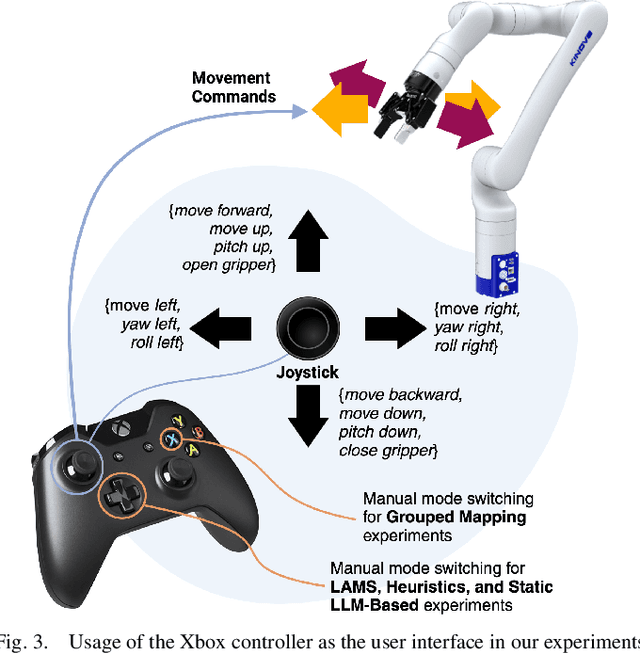
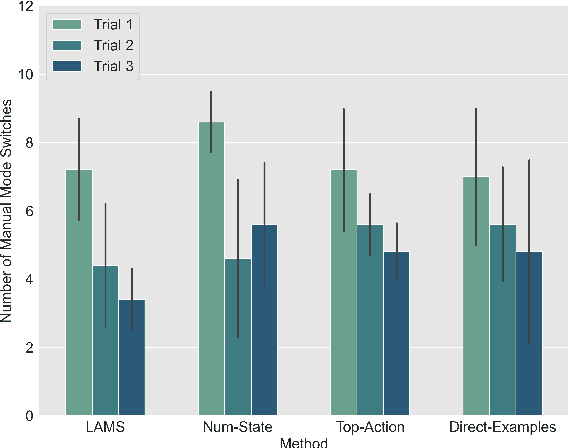
Abstract:Teleoperating high degrees-of-freedom (DoF) robotic manipulators via low-DoF controllers like joysticks often requires frequent switching between control modes, where each mode maps controller movements to specific robot actions. Manually performing this frequent switching can make teleoperation cumbersome and inefficient. On the other hand, existing automatic mode-switching solutions, such as heuristic-based or learning-based methods, are often task-specific and lack generalizability. In this paper, we introduce LLM-Driven Automatic Mode Switching (LAMS), a novel approach that leverages Large Language Models (LLMs) to automatically switch control modes based on task context. Unlike existing methods, LAMS requires no prior task demonstrations and incrementally improves by integrating user-generated mode-switching examples. We validate LAMS through an ablation study and a user study with 10 participants on complex, long-horizon tasks, demonstrating that LAMS effectively reduces manual mode switches, is preferred over alternative methods, and improves performance over time. The project website with supplementary materials is at https://lams-assistance.github.io/.
Incremental Learning for Robot Shared Autonomy
Oct 08, 2024



Abstract:Shared autonomy holds promise for improving the usability and accessibility of assistive robotic arms, but current methods often rely on costly expert demonstrations and lack the ability to adapt post-deployment. This paper introduces ILSA, an Incrementally Learned Shared Autonomy framework that continually improves its assistive control policy through repeated user interactions. ILSA leverages synthetic kinematic trajectories for initial pretraining, reducing the need for expert demonstrations, and then incrementally finetunes its policy after each manipulation interaction, with mechanisms to balance new knowledge acquisition with existing knowledge retention during incremental learning. We validate ILSA for complex long-horizon tasks through a comprehensive ablation study and a user study with 20 participants, demonstrating its effectiveness and robustness in both quantitative performance and user-reported qualitative metrics. Code and videos are available at https://ilsa-robo.github.io/.
 Add to Chrome
Add to Chrome Add to Firefox
Add to Firefox Add to Edge
Add to Edge